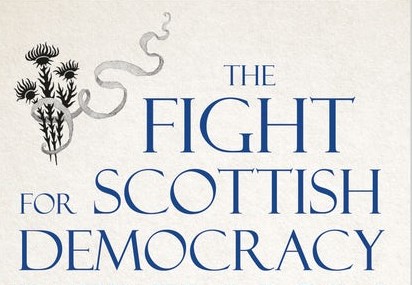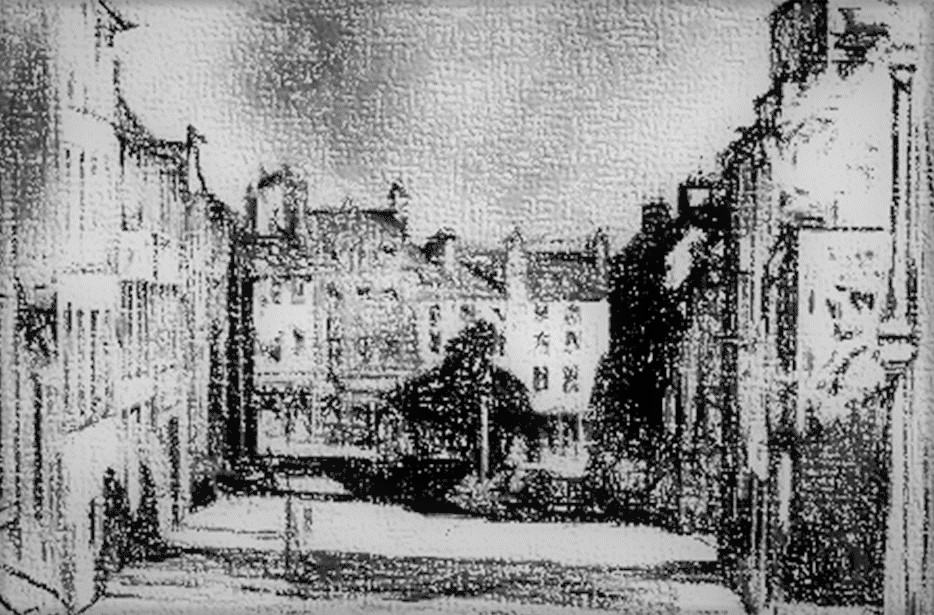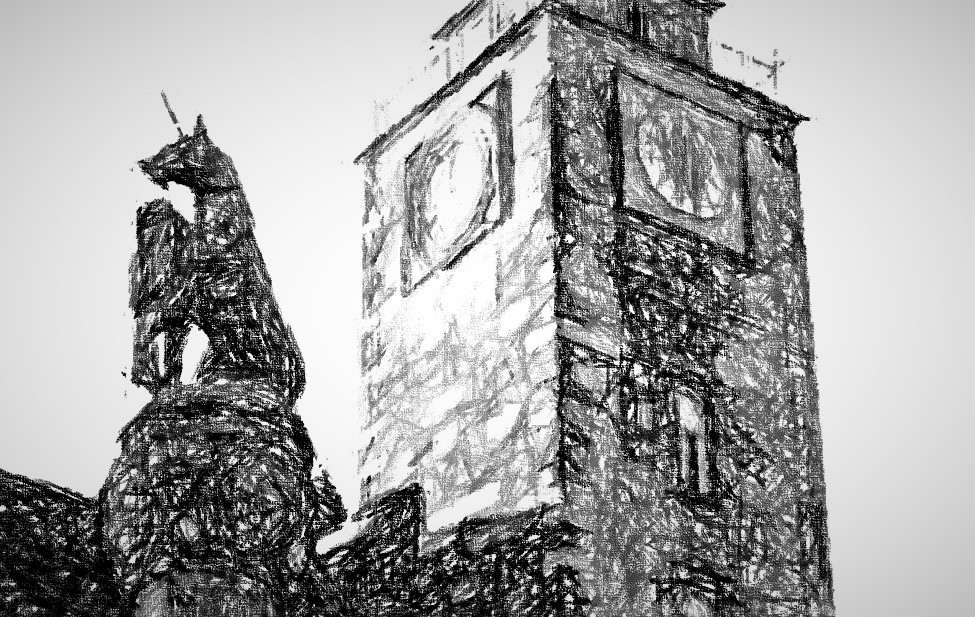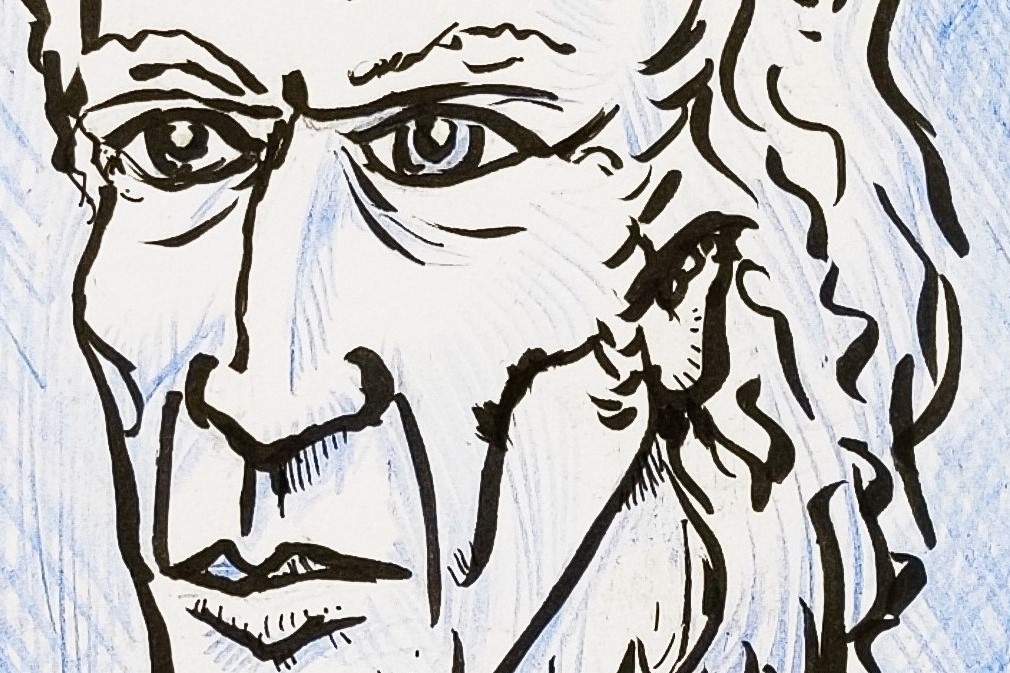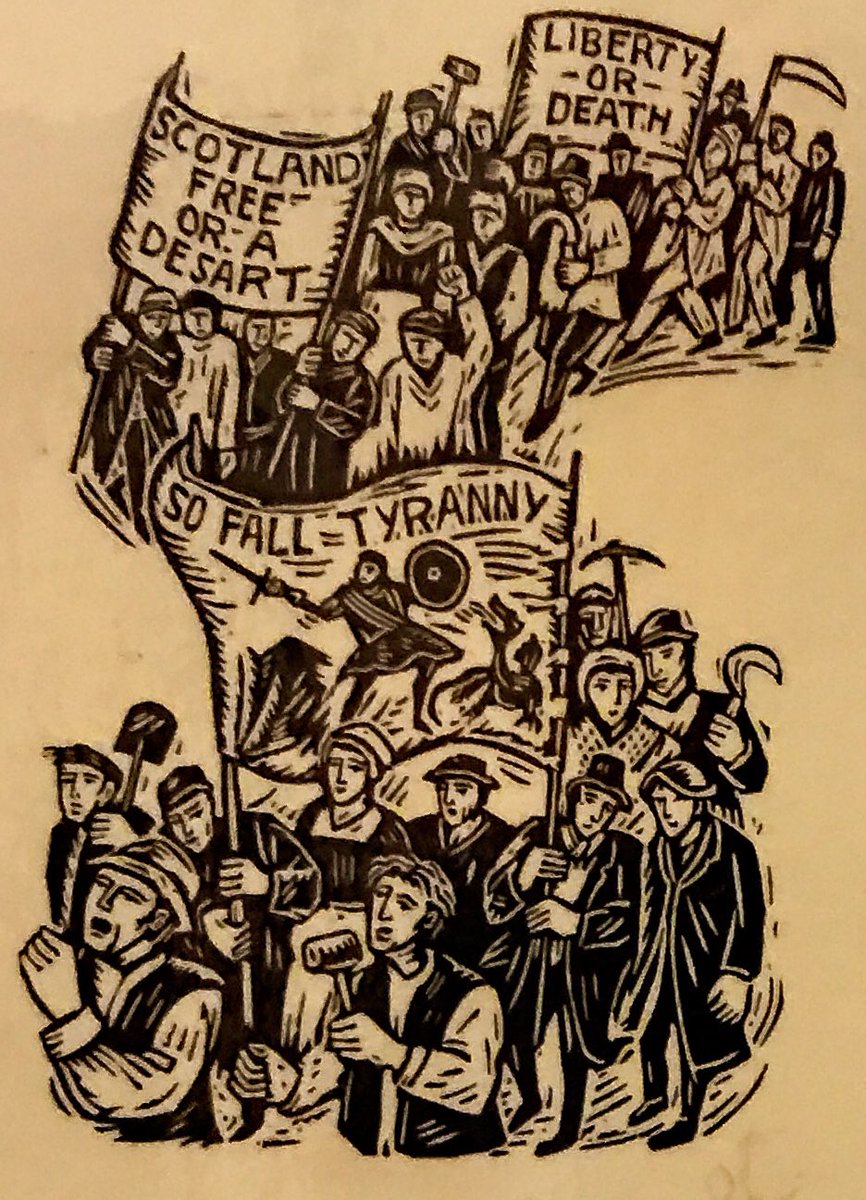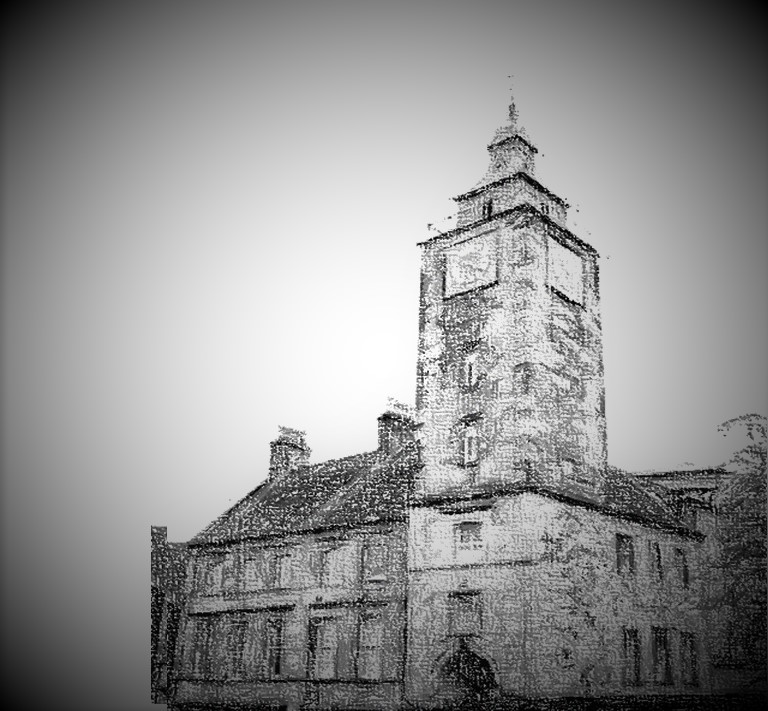
CHAPTER XIV
This is Chapter XIV of the serialisation, the wording reproduced exactly as it appeared in the Stirling Sentinel, on Tuesday 14th May 1889.
The efforts made for a reprieve – The Rev. Dr Chalmers a noble exception to his brethren – Hardie’s artless words touch the heart of a cabinet minister – no use: the law must take its course – More letters by Baird and Hardie – Daniel Taylor, the Kilsyth Poet – His promise to Baird – Drawing near the end.
In a long letter, dated 1st August 1820, and addressed to his cousin, Mr Robert Goodwin, Glasgow, Andrew Hardie gives a detailed account of the battle of Bonnymuir, from which we have already quoted, and we need not go over the same ground again.
Strenuous exertions were made to save Baird and Hardie from the scaffold, but in vain. Some of the unfortunate men’s relations were personally known to Admiral Fleming, of Biggar and Cumbernauld, who afterwards represented the county of Stirling in the Reformed Parliament, and he strongly supported the petition on their behalf, which was largely signed in Glasgow. Mr Graham of Whitehill, afterwards Lord Provost of Glasgow, the Rev. Dr Chalmers, and the Rev. Dr Ralph Wardlaw, also gave all the assistance in their power.
Mr Goodwin says – “When I waited on Dr Chalmers, respectfully to solicit his signature to the petition, he told me that he was expressly enjoined by the authorities not to interfere, yet he assured me that he felt so much for the young man (Hardie) that he would willingly do anything in his power to serve him, believing as he did that he was the victim of designing men. Upon this, Dr Chalmers, who was in bed at the time, arose and instead of merely giving his signature he wrote a note to the petition, which contained an attestation of Hardie’s character, expressed in very high terms, and which also stated that he (Mr Chalmers) had previously made personal inquiry regarding Andrew Hardie, and was fully convinced that in his case the ends of justice would be gained by mercy and not by punishment. The only other Established minister who would sign this petition was Mr Marshall, at that time minister of the High Church. But amongst Dissenters, the Rev. Drs Ewing and Wardlaw put their names to it readily.”
Mr Grahame left his business in Glasgow and posted to London for the express purpose of interceding with the Government for a reprieve for the condemned prisoners. He had read some of the letters poor Hardie had written in his cell in Stirling Castle, and they moved him to a degree which no letters had ever done before. In a postscript to one of his letters, Hardie used this expression – “Be sure to be kind to my poor canary” – a bird that would be singing to him in its cage in his humble loom-shop in Glasgow. When Mr Grahame pointed out those simple artless words to Lord Wharncliffe, the tears started to his eyes and he exclaimed, “Good God! He cannot be a cold-blooded wretch that could write such a sentiment. I will intercede for him with my colleagues.” But his Lordship’s colleagues in the Cabinet sternly decided that the law should take its course. This incident of the petition and other efforts that were made in the interest of Baird and Hardie, explain allusions that will be found in some of the letters printed below.
Writing to his brother on 14th August, Baird said the sentence of death had as little impression on him as if the Lord President had read an old ballad. He was prepared for the worst. Hardie, in a letter dated 19th August, and addressed to his “dear relations”, says:- “In addition to my good health, I enjoy a calm and composed mind, which is one of the greatest blessings the Almighty bestows on the human race, and with those excellent advantages I am labouring in His vineyard with diligence. And although I find myself altogether an unworthy and unprofitable servant, and my sun nigh about to set, yet under the consolatory promises and assurances that are set before us, and through the merits of a blessed Saviour, I trust the short I give will be acceptable, and I hope I shall receive my penny, with those that went in at the eleventh hour. My dear friends, although I am to be taken away in the bloom of life, and to suffer an unnatural death, this gives me very little concern, knowing that he who gave me life can take it when it seemeth good for him to do so; and ever blessed be his holy name, he takes but what he gave. …I have been visited several times by Mr Heugh, to my great satisfaction, and have profited much by his instructions. I have little more to inform you of at present. I take my victuals regularly, and sleep as well as ever I did in my life.”
Stirling Castle, August 28, 1820
MY DEAR FRIENDS, – I take this opportunity of transmitting a few lines. I was much surprised at being visited by my grandfather, as I did not expect him; I was truly happy to see him, and I earnestly hope that our next meeting will be in the happy land where sorrow never enter – where all is love and harmony. You would understand by my brother and cousin that Mr Baird and me were advised to send petitions to the Lord Advocate, signed by the Provost and two Baillies of this town, several clergymen and other respectable gentlemen, but we have not got an answer yet. However, we expect nothing favourable. The petition was drawn out according to your request, but I hope you are putting no dependence upon it, as I am fully persuaded that it will be of no service. Our time is drawing on apace, and I earnestly entreat you to shift your mind off me as much as possible; you ought rather to bless God that I am going to be separated from an evil world. It is my earnest prayer that you may be supported in this trying circumstance. My uncle wishes me to write to him concerning my eternal concerns, but I intend to draw up a few words to my brothers and sister, which I hope will be useful to them, and at the same time show you my belief. I have little more particular to say at present. I earnestly hope that you are all in good health. – I remain your sincere friend and well-wisher. ANDREW HARDIE
Directed to Widow Hardie.
Stirling Castle, Sept 1, 1820
DEAR SIR, – I take this opportunity of transmitting a few lines to let you know that I am in good health and spirits – thank God for his great service to me in this last and closing period of my life. And although I am within a few days of being separated from this world, it gives me very little uneasiness, as I trust I am going to make a good change; and with faith in a blessed Saviour, I hope I shall be transferred from a state of warfare to a state of peace – from a miserable transient world to a state of happiness; and with this in view, I am waiting with patience till my change come. …I hope you will put yourself to no concern about me, as I am perfectly resigned to my fate, hard as it is. Give my kind compliments to Mr Watson; you may if you please give him a perusal of this letter. Give my compliments also to Helen, and let her know that she may expect a letter from me in a few days. – I am my dear friend, your unfortunate friend, ANDREW HARDIE.
P.S. – I hope that you will look over any inaccuracies and the manner that this letter is written, as I had but little time, and my friends who are to carry this letter are upon the eve of going away. A. HARDIE
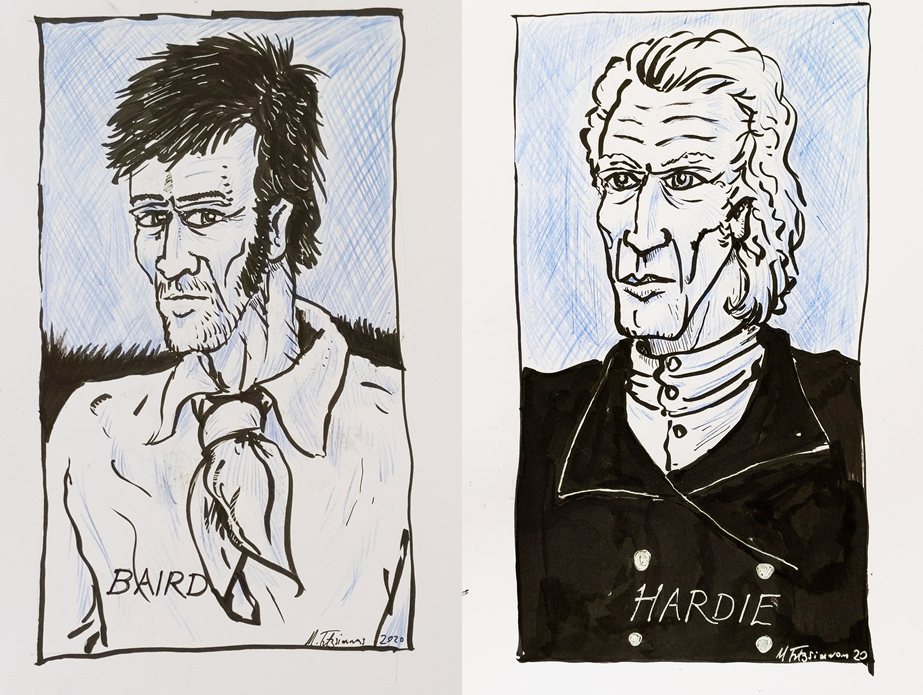
Daniel Taylor of Kilsyth, who occasionally wrote some scraps of local poetry, was a faithful friend of John Baird’s, and to him the following letter was addressed:-
September 4, 1820
DEAR FRIEND, – I take this opportunity of sending you this long and last farewell. On Friday, I am to be made immortal. Although man may mangle this body, yet, blessed be God, he has kept the most noble part in his own hand. I do not mean to say anything about them who have been so sore against me, for I have made it my study to forget and forgive all men any wrong that they have done to me. I received your kind and welcome letter. It cheered my very heart to think you wish to go so far to see my grave; and it gave me some consolation to hear you say you will write my dirge. All this you have said, I hope you will do. It gives me no small concern to think that any person blamed you concerning me; that I never could do; I look upon you still as my trusty friend; but you know men are oft blamed when they are not worthy of it. I hope that you will let all animosity cease, and let love and harmony abound, is the sincere wish of your dying friend.
“Let troubles rise and tyrants rage,
And days of darkness fall;
But those that wait upon the Lord,
Shall more than conquer all.”
“If God be for us, who can stand against us?”
“It is God that justifieth, who is he that can condemn?”
No more from your dying friend, a martyr to the cause of liberty. May the grace of God protect you and yours. Give my kind love to all friends of liberty. JOHN BAIRD
There was added to the above the following quote from Hardie:-
DEAR SIR,- This comes from a hand you never saw, to the best of my knowledge – from a hand that in a few days must mingle with its native dust. Hard is our fate, my dear and unknown friend; yet, I resign my life without the least reluctance, knowing that it is for the cause of truth and justice; and to which I remain under conviction. I die a martyr.
“I die firm to the cause, like a magnet to its pole,
With undaunted spirit and unshaken soul,”.
My dear friend, I must bid you farewell; and I hope you will keep in your remembrance the cause for which Baird, Hardie and Clelland died on the scaffold. No more! Farewell! – I am sir, your obedient servant, ANDREW HARDIE.
Stirling Castle, Sept. 5, 1820
MY DEAR RELATIONS, – I now write you my long and last farewell letter, as I am in a short time to fall a victim beneath the stroke of the tyrant, for seeking these rights for which our forefathers bled, and for which I shall lay down my life without the least reluctance, knowing it is for the cause of truth and justice. I have wronged no person, I have hurt no person, and although I have formerly been of a very easy temper, I bless God, who has the hearts of all men in His hand, that it never entered mine to hurt my fellow creatures, and no person could have induced me to take up arms in the same manner to rob and plunder. No my dear friends, I took them up for the good of my suffering country, and although we were outwitted, yet I protest as a dying man, that it was with a good intention on my part. But, dear friends, it becomes me as a dying Christian to look over all these matters, which, bless God, I can do with pleasure. If I can’t forgive my enemies or those that have injured me, how can I expect my blessed Saviour to make intercession for me, who so freely forgave his. Even when expiring on the cross he prayed for his enemies – “Father, forgive them, for they know not what they do.” I could take the greatest enemy that I have into my bosom, even the perjured Baird, who in the presence of Almighty God and a large assembly, stained and imbrued his hands in my innocent blood – even also the unrelenting Hardie…who voluntarily came to prove my ruin. Yes, my friends, my earnest prayer to God is that he may forgive them. My dear friends, I again hope you will put yourselves to as little concern about me as possible. It becomes us to submit to the will of God, and to every dispensation of his Providence. He is infinitely pure. He can do nothing wrong. He chasteneth whom he loveth. And I earnestly hope and pray that he will sanctify the dispensation of his Providence to me and all of us.
I remain, your unfortunate brother, while on earth, ANDREW HARDIE
After addressing a few lines to his young cousins, full of solemn counsel, Hardie penned the following postscript:-
Hardie and Baird, alluded to in this letter, is Mr Hardie, Justice of the Peace, from Glasgow, and Mr Nicol Hugh Baird, civil engineer at Kelvinside, and private in the Kilsyth Yeomanry Cavalry. These two were the principal witnesses against me. But I freely forgive, and I hope you will keep no ill-will at them, and as my prayers on this earth will soon be ended, I earnestly beg of you to mind them in yours. Again farewell, till, I hope, we meet in glory, A. HARDIE
To be continued…
The next part of the serialisation will be published on Tuesday 22nd December

